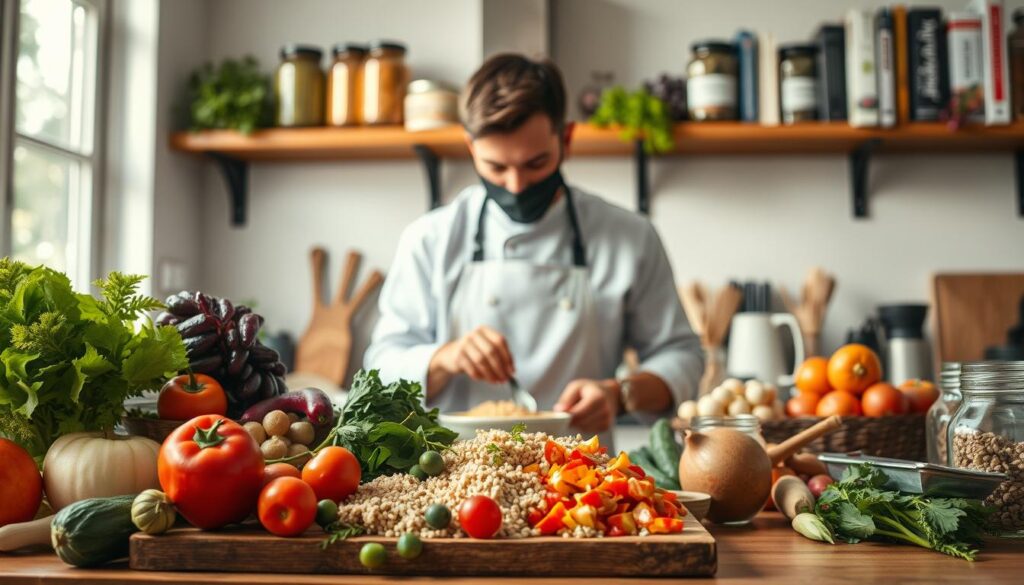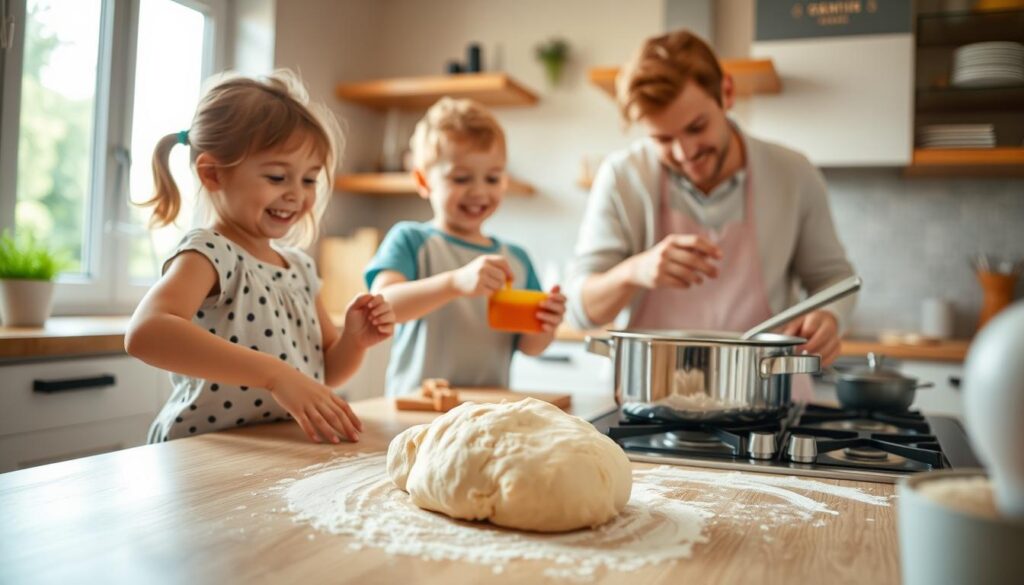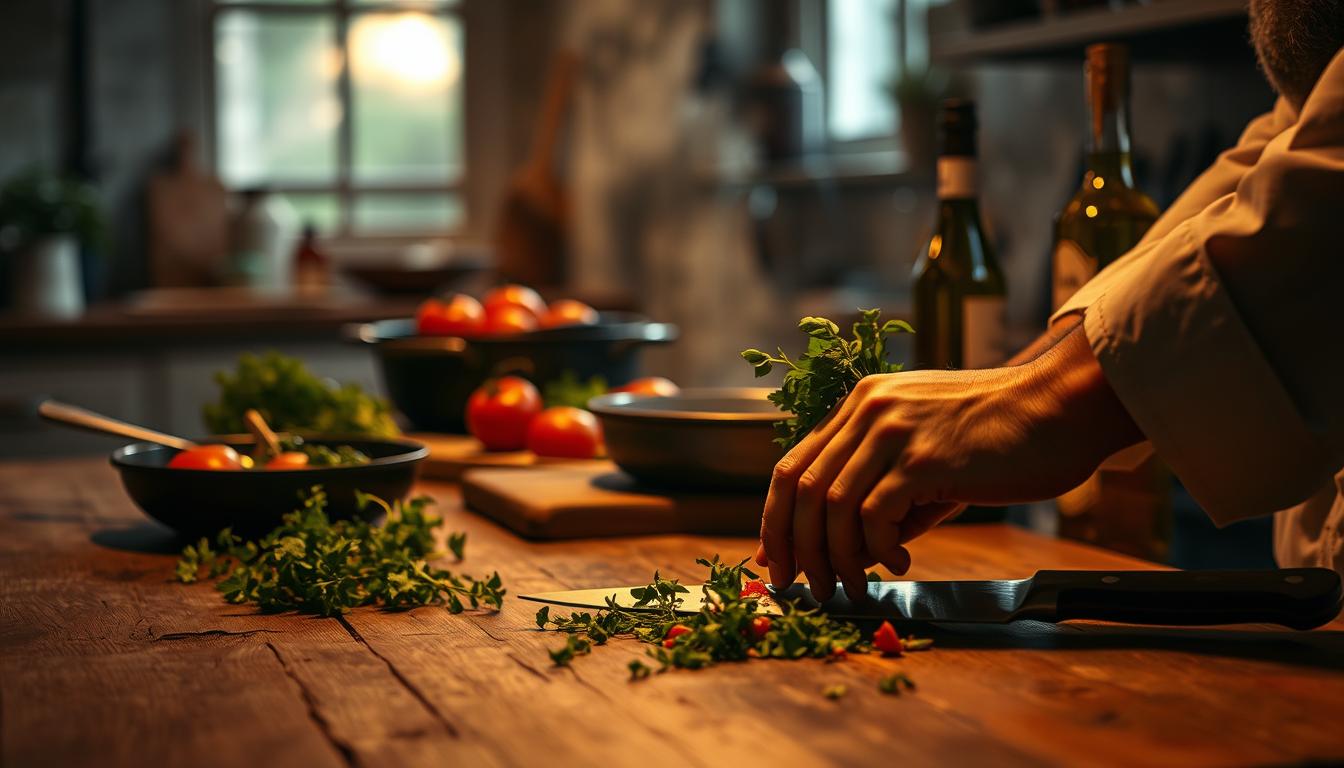We think anyone can become a great home cook with the right advice. Following tips from pros like Guy Fieri can help. For example, using a high BTU burner heats the grill faster and hotter. This makes outdoor cooking better.
Also, practicing recipes ahead of time and using seasonal ingredients helps save money and reduces stress. This way, you can make delicious and impressive meals.
By using expert advice, we can make our dinners better and create meals our family and friends will love. Techniques like cooking steak the reverse-sear way or dry aging prime rib can make a big difference. With the right tips, we can learn many cooking methods and make a variety of tasty dishes.
Key Takeaways
- Use expert culinary advice to elevate your dinner game
- Practice recipes in advance to reduce stress and optimize budget cooking
- Incorporate seasonal ingredients to add variety to your meals
- Use high-quality ingredients, such as full-fat ingredients, to achieve full flavor in dishes
- Follow simple culinary tips, such as washing berries in an apple cider vinegar solution, to reduce spoilage and maintain freshness
- Invest in essential kitchen tools, such as vacuum sealers, to preserve and marinate food
- Label opened products to maintain organization and understanding of ingredient freshness
Understanding the Fundamentals of Cooking
Mastering the basics is key to making tasty dinner recipes. Guy Fieri says practice and prep are vital for better cooking. Trying recipes before and doing tasks the day before can help avoid stress and make cooking smoother.
Knowing different cooking methods is important. This includes baking, roasting, grilling, and broiling. Each method has its own temperature and technique. Using the right method can greatly improve dish quality.
Importance of Techniques and Skills
Knife skills are a basic technique that boosts cooking efficiency and safety. With good knife skills, cooks can chop ingredients fast and accurately. This makes cooking more fun.
Mastering Knife Skills
A sharp knife is key for precise cuts and safety. Getting a good knife set, like a chef’s knife, paring knife, and serrated knife, can enhance your cooking experience.
Cooking Methods Overview
Knowing various cooking methods opens up a world of dinner recipes. From simmering and poaching to baking and roasting, each method needs specific techniques and temperature control. Mastering these methods lets cooks try new recipes and ingredients, elevating their cooking.
With these basic techniques and skills, home cooks can make delicious dinners and enhance their cooking journey. Following these tips and tricks can turn anyone into a skilled home cook, enjoying the perks of cooking at home.
Essential Kitchen Tools Every Cook Should Have
We think the right equipment is key for cooking. The tools you use can really make a difference. A good burner and using charcoal for grilling can improve your cooking.
Some must-have cookware includes a cast iron pan, nonstick set, and Dutch oven. For prep, a chef’s knife, serrated knife, and cutting boards are essential. A fish spatula and mandoline, like the Super Benriner, are also great additions.
Must-Have Cookware
Cookware is a big investment for home cooks. Some key items are:
- Cast iron pan: $15-$50
- Nonstick set: $20-$100
- Dutch oven: $50-$200
Best Tools for Food Preparation
Food prep is a big part of cooking. Some must-have tools are:
- Chef’s knife: $10-$50
- Serrated knife: $5-$20
- Cutting boards: $10-$50
Innovations in Kitchen Gadgets
New kitchen gadgets can make cooking easier and more efficient. Some examples are:
| Gadget | Price | Description |
|---|---|---|
| ThermoWorks Thermapen One | $109 | Precise temperature readings for meat cooking |
| Super Benriner mandoline | $80 | Efficient and easy to use for slicing and julienning |
| Y-peeler | $5-$10 | Easy to use and efficient for peeling fruits and vegetables |
Investing in these essential tools and gadgets can elevate your cooking. It will help you make the most of your kitchen hacks, expert cooking tips, and culinary advice.
Meal Planning: Creating Balanced Menus
Creating balanced menus starts with meal planning. Guy Fieri says planning meals and using seasonal ingredients makes dinner recipes delicious and balanced. We should list our favorite cooking tips to use in meal planning.
A good meal plan reduces stress and saves time. It lets us think about our dietary needs and preferences. This way, we can make a menu with a variety of dinner recipes.
- Protein sources, such as lean meats or plant-based options
- Whole grains, like brown rice or quinoa
- Fresh fruits and vegetables, which can be incorporated into dinner recipes
- Healthy fats, such as nuts or avocado
Following these tips, we can make balanced and tasty dinner recipes. Meal planning is fun and rewarding, improving our well-being.
Meal planning is about finding a balance between nutrition and taste. By using our favorite dinner recipes and tips, we can make a meal plan that suits us and our families.
| Meal Planning Benefits | Description |
|---|---|
| Reduces stress | Having a plan helps avoid last-minute decisions and reduces stress during the week. |
| Saves time | Meal planning saves time by avoiding unnecessary grocery trips. |
| Improves nutrition | Planning meals ensures we get the nutrients we need for health. |
Flavor Profiles: Enhancing Your Dishes
Flavor profiles are key to making dishes better. With the right culinary advice, you can take your dinner recipes to the next level. Andrew Zimmern suggests adding brown sugar, fish sauce, and butter to boost flavors.
When thinking about flavor profiles, there are a few important things to remember. These include:
- Salt: it’s essential for bringing out flavors, with studies showing that a well-salted dish can keep up to 90% of its flavor.
- Fat: adding fat can make a dish richer by about 50%, improving its feel in your mouth.
- Acid: acid can make flavors pop, with research showing it can increase flavor intensity by up to 30%.
- Heat: using heat, like searing or confit, can change texture and flavor in about 80% of ingredients across different cuisines.
By using these elements and following expert cooking tips, you can make dishes with complex and balanced flavors. Season early and taste often to boost flavor satisfaction by about 40%. With time and effort, you can create your own unique flavors and become a master of culinary advice.
Recipe Development: Finding Your Unique Voice
Exploring culinary arts shows us how important recipe development is. It lets us add our own twist to classic recipes. Guy Fieri says trying new ingredients and recipes helps us find our cooking style.
For great culinary tips, start with quality ingredients and precise measurements. Paying attention to cooking techniques makes our dinner recipes both delicious and beautiful.
To get better at recipe development, listen to cooking advice from chefs. Try different ingredients and flavors to make unique dishes. This way, we can create our own signature style in cooking.
Starting with Classic Recipes
Classic recipes are a solid base for developing new recipes. We can make them our own by adding unique spices or ingredients.
Experimenting with Ingredients
Trying new ingredients is key in recipe development. Using exotic spices or unusual meats adds depth and complexity to our dishes.
Documenting Your Culinary Journey
Keeping a journal or blog is vital for tracking our culinary journey. It helps us record our recipes, note our successes and failures, and see how we’ve grown.
Cooking for Special Diets
When cooking for special diets, the right cooking advice is key. Food allergies and dietary needs are on the rise. We offer kitchen hacks and expert cooking tips for special diets.
Popular dishes like Japchae, Breakfast Casserole, and Red Lentil Soup can be adapted. They fit various diets, such as gluten-free, dairy-free, and vegan. With cooking advice from chefs and kitchen hacks like tamari, you can make tasty, safe meals.
Here are some allergy-friendly swaps:
- Tamari for soy sauce
- Sunflower seed butter for peanut butter
- Vegan, non-dairy milks for cow’s milk

Follow these expert cooking tips and use the right kitchen hacks. You can make many dishes for different diets. Always focus on food safety and use fresh ingredients for the best taste.
| Dish | Dietary Options |
|---|---|
| Japchae | Gluten-free, dairy-free, vegan |
| Breakfast Casserole | Gluten-free, dairy-free, vegetarian |
| Red Lentil Soup | Gluten-free, dairy-free, vegan |
The Art of Plating and Presentation
When it comes to dinner recipes, how you present them matters as much as how they taste. We share tips on how to make your dishes look great with simple tricks. A study by Oxford psychologist Professor Charles Spence showed that food looks up to 29% tastier when it’s well-presented.
Here are some key considerations for plating and presentation:
- Keep it simple: Avoid overcrowding the plate with too many elements.
- Use color: Incorporate a variety of colors to make the dish visually appealing.
- Pay attention to symmetry: Use symmetry to create a balanced and harmonious presentation.
By following these tips and using our culinary advice, you can make dishes that are both tasty and beautiful. Remember, simple tricks like using fresh herbs as garnishes can greatly enhance your dishes’ look.
In the world of culinary arts, presentation is everything. By mastering the art of plating and presentation, you can elevate your dinner recipes. This will create a truly unforgettable dining experience.
| Tip | Description |
|---|---|
| Use a plain white plate | To improve the presentation of diverse food colors and textures |
| Add garnishes | To improve the visual complexity of dishes and increase perceived value |
Navigating Cooking Timelines
Timing is key in cooking. We’ve all been in the kitchen, juggling dishes and hoping for the best. To avoid stress, making a personal cooking timeline is vital. This way, we can cook efficiently, just like Guy Fieri suggests.
With the right kitchen hacks and expert cooking tips, we can plan our cooking. This means prioritizing tasks like preparing ingredients and cooking proteins. This approach helps us cook without stress and makes it more fun.
Developing a Personal Timeline
To make a personal timeline, we must think about our cooking style and dishes. We need to consider the cooking methods and how long each dish takes. Planning ahead helps us cook everything perfectly.
Efficiency in the Kitchen
Being efficient in the kitchen means using kitchen hacks and expert cooking tips. Tools like a digital probe thermometer help us cook meat right. A well-stocked pantry also saves time and stress.
With good culinary advice and a timeline, cooking becomes easy. Whether for one or many, having a plan ensures perfect results. We can then enjoy cooking without worry.
Tips for Cooking with Kids
Cooking with kids is a great way to spend time together. It also helps them grow in many ways. Kids who help cook get better at using their hands, learn new words, and try new foods. A study showed that kids who cook with parents are more likely to keep cooking and enjoy food.
It’s important to keep kids safe in the kitchen. Teach them to wash their hands and watch them with sharp objects or hot surfaces. Guy Fieri says cooking with kids helps them eat healthy and enjoy food. We can share cooking advice and dinner recipes that kids can help with, making it fun for everyone.
Here are some tips for cooking with kids:
- Start with simple recipes
- Use ingredients kids like
- Make it fun and engaging

By following these tips, we can help kids love cooking and eating healthy. With the right cooking advice and dinner recipes, cooking with kids can be fun for everyone. It also helps them develop healthy eating habits and a good relationship with food.
| Age Group | Cooking Tasks | Benefits |
|---|---|---|
| 2-6 years | Mixing, pouring | Enhances hand-eye coordination and fine motor skills |
| 7-12 years | Measuring, stirring | Develops math skills and attention to detail |
| 13+ years | Cooking, baking | Promotes independence and self-confidence |
Resources for Continued Learning in Culinary Arts
Aspiring home cooks know the value of always learning and improving in the kitchen. Mastering the kitchen is a lifelong journey. There are many resources to help us get better at cooking and feel more confident.
There are cookbooks, food blogs, online classes, and local workshops to explore. These options help us keep up with new cooking techniques, trends, and flavors. We should try different resources to grow our cooking skills.
Recommended Cookbooks and Blogs
For those who love physical cookbooks, check out “Salt, Fat, Acid, Heat” by Samin Nosrat and “The Food Lab” by J. Kenji López-Alt. These books offer tasty recipes and deep insights into cooking science and theory.
Online Culinary Classes and Tutorials
The internet has changed how we learn to cook, with many online classes and tutorials. Sites like Udemy and Coursera have courses for all skill levels. We can learn at our own pace and in our own kitchens.
Joining Local Cooking Groups or Workshops
For a hands-on learning experience, look for local cooking groups or workshops. These events let us learn from chefs, meet other food lovers, and cook together. They help us improve our cooking skills and explore new ideas.
As we wrap up our exploration of culinary advice, we’re ready for more cooking adventures. By always looking for new learning opportunities, we can improve our cooking and become more confident and creative.

